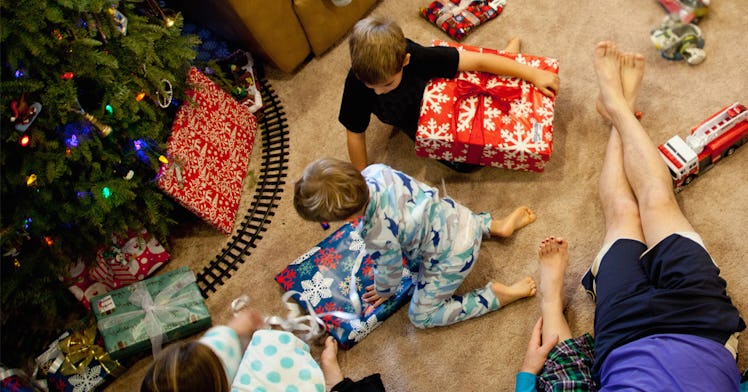Buying Presents For Kids Won’t Actually Make Them Happy. But There’s a Solution.
You've been doing the holidays all wrong.

Handwringing about the commercialization of Christmas is as much a yuletide tradition as hanging up stockings and decorating a tree. And yet it continues, unabated, with each Black Friday comes an avalanche of deals larger than the previous year’s whiles kids are sold a mythology that equates being good with getting stuff.
Parents should and do worry about what the culture of mass consumption is doing to their kids, particularly given the frenzied pitch it reaches during the holidays. They’re right to do so.
“We know that materialism is just a recipe for misery,” says Christine Carter, PhD, a sociologist and Senior Fellow at UC Berkeley’s Greater Good Science Center. So what can a parent do to fight back? Giving experience-based instead of material-based gifts is a great place to start.
“If you look at the research, absolutely you should get them experiences instead of stuff,” Carter says. “What we experience when we open a present, aside from the sort of surprise element of it, it’s not really a positive emotion.” Opening new things activates the rewards system in our brains on a surface level, but it’s not a mechanism that can provide deeper, longer-lasting feelings of happiness.
Receiving physical gifts for Christmas inevitably leads to hedonic adaptation, a phenomenon in which no matter how good or bad something makes us feel, we eventually get used to it and return to our previous happiness level. This happens because the immediate effects of the precipitating event (e.g. discovering how to play with a new toy) fade over time. And even the effects that remain (e.g. getting to play with that toy whenever you want) become part of the “new normal.”
Another word for this phenomenon is the hedonic treadmill, because buying gifts to make your kids happy is like running on a treadmill: it might make you tired but it doesn’t get you anywhere.
Gifting experiences, on the other hand, cause entirely different neurochemical reactions that are experienced as actually positive emotions like happiness or joy. The simple reason is that experiences end before we have time to adapt to them. It’s somewhat counterintuitive—wouldn’t the gift that wasn’t transitory foster happy feelings for a longer period of time?—but proven by numerous studies.
Carter says that in addition to happiness and joy, experiences can also bring us things that are more meaningful: “love and connection, shared character strengths, curiosity about something…things that have huge benefits.”
Of course, remaking your holiday traditions is easier said than done, particularly when popular culture preaches the opposite message and your kids are old enough to be used to more materialistic holiday seasons. Here’s some practical advice:
- Establish family traditions connected to the values you want your kids to associate with the holiday instead of the default materialism of unwrapping presents. Don’t just give them an experience; explain how that experience aligns with something your family values.
- You’ll be a part of the experience if you have younger kids, so don’t make it something you’ll struggle to get through. If you’re going to be exhausted and stressed the entire time you’re at Disneyland, your kid will sense it and it will harm their experience. Pick something everyone can enjoy and everyone will be happier.
- Once kids are old enough to do things by themselves, you can give them more latitude to ask for what they want, but you should also let them put some skin in the game. For instance, if your teenager wants to visit a friend on the other side of the country, pay for the flights but let them save up for souvenirs.
- You can give material gifts that are connected to the experiences, so your kids can still unwrap something. If your kids love to ski, you can get them a ski pass—the experience-based gift—along with new goggles or gloves, whatever material items they need to enjoy their time on the mountain.
By ditching material presents and giving experiences instead, you can remake the holidays into a time of year you and your kids look forward to each year and look back on with a greater sense of appreciation.
This article was originally published on